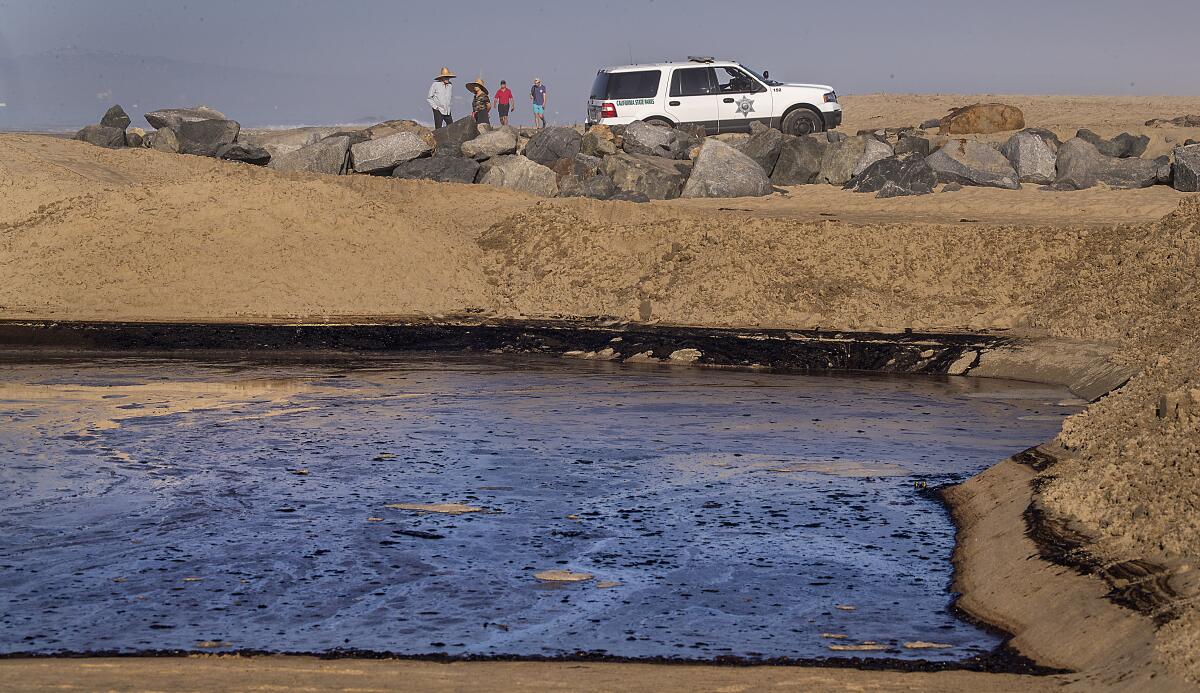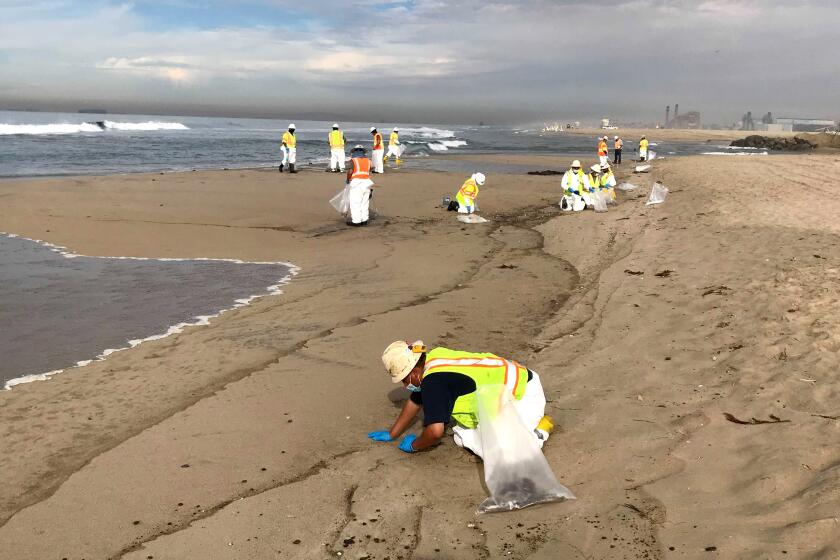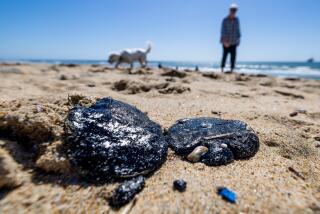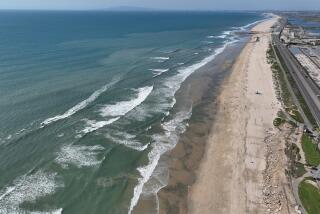Editorial: Huntington Beach shore is covered in oil. This is why the U.S. needs to end coastal drilling

- Share via
The Orange County coastline has become the latest casualty of the nation’s unhealthy dependence on oil. In one of the biggest California spills in decades, a pipeline connected to an offshoot oil platform off the coast of Huntington Beach released at least 126,000 gallons of crude over the weekend.
On Sunday morning, the smell of diesel and tar hovered in the coastal air as clumps of crude washed ashore, along with dead birds and fish. Out on the water, a vast oil slick larger than the city of Santa Monica had formed. Crews worked feverishly to clean up the oil that had seeped into the delicate coastal marshlands and to prevent greater damage to this essential habitat for migratory birds.
By Sunday night, Laguna Beach closed city beaches; golf-ball-size chunks of tar began to hit the shore there Monday. The waters off Laguna Beach include a marine protected area with sensitive ocean habitat. Orange County officials estimate that the affected beaches could be closed for weeks or even months.
This is why the U.S. needs to end coastal oil drilling.
Some 23 oil and gas drilling platforms are located in federal waters off the California coastline. This spill originated from a broken pipeline that runs between the Port of Long Beach and a processing platform called Elly, which was installed in 1980. Elly and two production platforms sit above a large reservoir of oil, in waters overseen by the U.S. Department of the Interior. Elly is part of a complex that has amassed a long record of federal noncompliance incidents and violations.
On Monday, the company that owns Elly suggested that the pipeline could have been struck by a ship’s anchor, and the Coast Guard is investigating that as one possible scenario for the rupture.
Environmentalists have long warned that aging oil infrastructure off the coast poses a serious risk — one activist described such facilities as “time bombs” — and that federal authorities may not be giving it enough scrutiny.
Many of these platforms are nearing the end of their useful life. There’s concern that as more established oil companies sell off the decades-old assets to smaller businesses, the new owners may not have the money or inclination to do the expensive work of maintaining them. That could leave taxpayers on the hook for cleaning up spills or the eventual decommissioning. So there’s a real need for federal intervention to begin responsibly phasing out drilling now to avoid greater harm.
New drilling permits haven’t been issued since the 1980s, amid increasing concern about the impact of oil drilling on coastal communities and ocean habitat. That almost changed under former President Trump. His administration sought to open all federal waters off the U.S. coastline to oil and natural gas exploration. The backlash from states was swift. Trump reversed course and proposed expanding bans on off-shore drilling in select federal waters.
California Sen. Dianne Feinstein in January proposed a bill that would permanently bar the federal government from allowing new leases to allow for the exploration, development or production of oil or natural gas off the coast of California, Oregon and Washington state.
A major oil spill off the coast of Huntington Beach, Calif., washed up on nearby Orange County beaches, killing fish and birds and threatening local wetlands.
It’s not hard to understand why states don’t want to see more drilling off the coast. Local economies are dependent on tourism, commercial and recreational fishing, leisure boating and other activities that benefit from clean, healthy coastal waters. In Huntington Beach, officials had to cancel the final day of the three-day Pacific Airshow, which draws thousands of people to watch flyovers by the U.S. Navy Blue Angels and other jets.
While large-scale spills are somewhat rare in California, they can be devastating when they occur. In 2015, a pipeline along U.S. 101 broke and sent more than 100,000 gallons of oil into the nearby coast. Some 204 birds and 106 marine mammals died as a result of the spill, and Refugio State Beach was closed for two months while workers tried to remove the oil. Spills at sea are exceedingly more difficult to clean up than those on land, and the oil they unleash spreads with the currents. We already know the U.S. needs to wean itself off oil and gas to help the planet avoid the worst impacts of climate change.
This spill illustrates that the threat to the coastal environment isn’t just hypothetical and that we need to move much faster to phase out coastal oil drilling.
More to Read
A cure for the common opinion
Get thought-provoking perspectives with our weekly newsletter.
You may occasionally receive promotional content from the Los Angeles Times.











